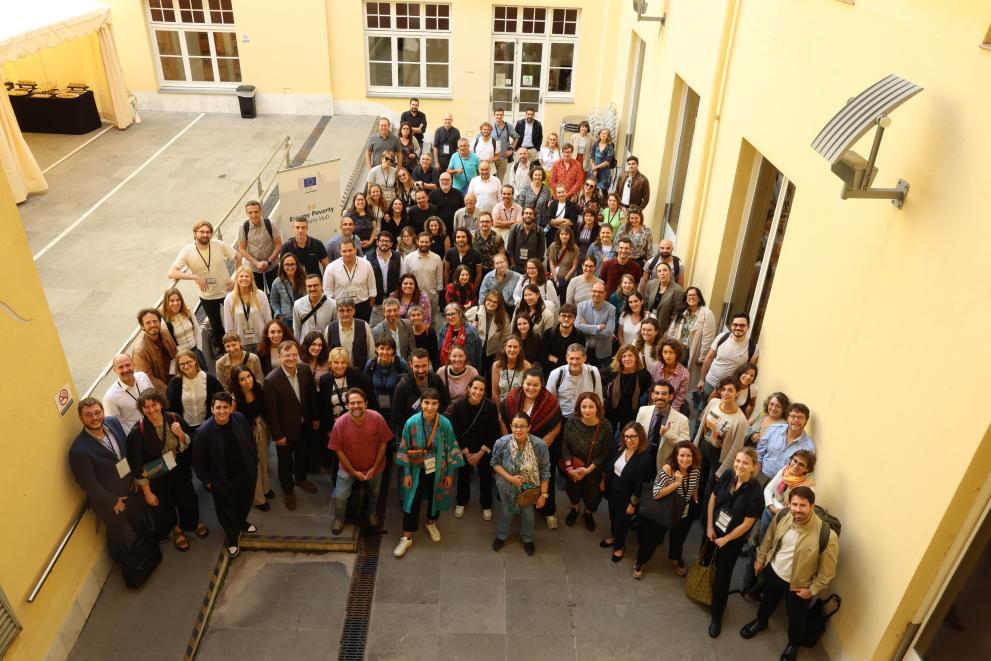
The 4th Energy Poverty Advisory Hub (EPAH) international conference opened with a statement from Marc Serra, Deputy Area Chairman for Climate Action and Energy Transition of the Province of Barcelona: “Energy poverty should be in the center of the energy transition.” Commissioner for Social Action of the City of Barcelona, Sonia Fuertes, also advocated for solutions based on a model of public-social collaboration with the active participation of the civil society to multiply the the impact of public policies. These sentiments set the stage for the two-day event held on 15-16 October 2024 at Espai Francesca Bonnemaison and La Casa dels Entremesos, in Barcelona.
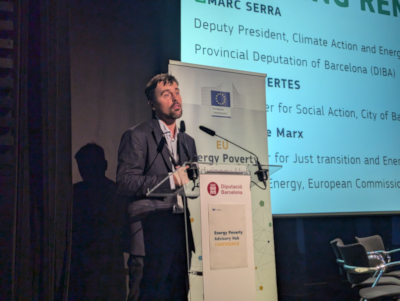
The conference titled “Turning the tide: paving the way for energy poverty alleviation” brought together 248 in-person participants and 208 online attendees from across Europe, representing local governments, EU institutions, civil society organisations, and a wide range of stakeholders focused on addressing energy poverty and promoting a just energy transition.
In the welcoming remarks, Veronique Marx, Team Leader for Just Transition and Energy Poverty at the Directorate General for Energy of the European Commission, emphasised that the EU has introduced various EU-level provisions that must be transposed by Member States. “The role of local communities is critical in ensuring these measures are applied effectively on the ground, securing a just transition for all.”
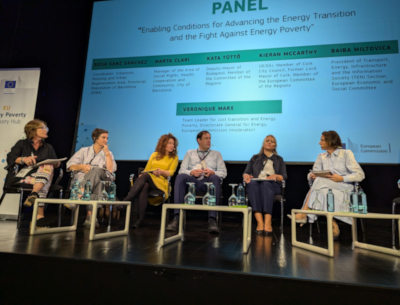
During the opening panel, which focused on innovative policies, collaborative frameworks, and strategic investments required to foster a sustainable energy future, Kata Tüttő, Deputy Mayor of Budapest and Member of the Committee of the Regions, shared valuable insights into how gender and biological differences lead to differing energy needs between men and women. She emphasized that these factors should be considered when discussing approaches to tackle energy poverty. Notably, she remarked: “Women are not small men.”
This year’s EPAH conference focused on exploring policies and strategies aimed at alleviating energy poverty, drawing on practical experiences from cities with varied approaches to addressing the issue. During a parallel session, speakers from 10 different municipalities shared the results of inspiring EPAH Technical Assistances, highlighting key outcomes, lessons learned, and future plans shaped by the support provided. Marcos Boj from ECODES, discussed the challenges of data collection and stakeholder engagement observed in Gironès region in Spain. “What is not defined cannot be measured. What is not measured, cannot be improved; what is not improved is always degraded.”
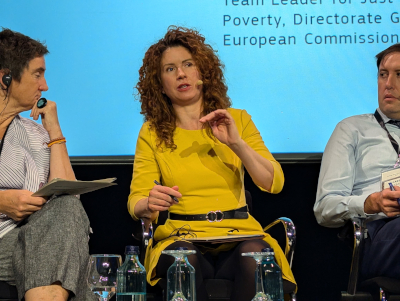
Another highlight of the conference was the session on “Artificial Intelligence and Energy Poverty: Innovative Solutions and Strategic Alliances.” This panel explored the novel role AI can play in addressing energy poverty. Experts from the public and private sectors discussed how AI-driven tools can empower citizens, improve decision-making, and enhance vulnerability assessments. Specifically, Jordi Cipriano Lindez Director, Department of Buildings Energy and Environment (BEE Group), International Center for Numerical Methods in Engineering (CIMNE), emphasised that: “AI delivers tools which help in making decisions—assessing vulnerability in urban areas at a high detail level to support customized energy awareness services.”
The “Recognition of the Gender Dimension in Energy Poverty” panel provided a crucial platform for discussing how women are disproportionately affected by energy poverty, especially in women-led households. Drawing on the EmpowerMed and Empowering Underrepresented Women in the Energy Sector (EUWES) projects, speakers delved into strategies for addressing these inequalities, from enhancing women's access to energy education and resources to promoting gender-inclusive policies in energy decision-making processes. Katjuša Šavc, Senior Expert at the Focus Association for Sustainable Development highlighted the lack of women representation in the energy sector and the importance of capacity building and awareness. "Training on gender bias, including unconscious bias, is crucial—especially for those in decision-making roles, such as promotion or hiring. Without diversity in hiring commissions, there’s a higher chance that men will hire other men".
Aside from the two mentioned above, the other panels were centred around the following topics: social climate plans, human rights-based approach to tackling energy poverty, inclusion, and energy communities.
The conference also offered a wide array of workshops that provided participants with practical tools and insights for tackling energy poverty. One of the key workshops, “One-Stop Shops for Inclusion of Vulnerable Consumers in the Energy Transition”, featured case studies from successful initiatives such as the ReHABITA project. Anamari Majdandžić, Senior Expert at Society for Sustainable Development Design (DOOR), highlighted the challenges of reaching vulnerable consumers: “Despite offering 100% funding for energy poverty support, we faced a lack of applications. Our idea to reach the vulnerable consumers is to work with the social services.”
The “Introducing Health in the Design of Urban Programmes to Fight Energy Poverty” workshop provided an in-depth look at the impacts of energy poverty on health. Based on WELLBASED EU project results, experts discussed how urban planning initiatives can incorporate health considerations. Notably, Noemi Gardia Lepetit, WELLBASED Project Coordinator, stated, “Our findings indicate that a significant portion of households—60-70%—are living in conditions that negatively impact their health, such as dampness and energy bill arrears.” Elena Rocher, Health I+D+i Programme Officer, further emphasised the need for a multidimensional approach, noting that health inequalities are avoidable through the right policies, and energy poverty requires a comprehensive strategy that addresses various determinants of health.
Other workshops covered the following topics: summer energy poverty, mastering data for effective and inclusive policies, and socioeconomic insights and youth perspectives linked to energy poverty.
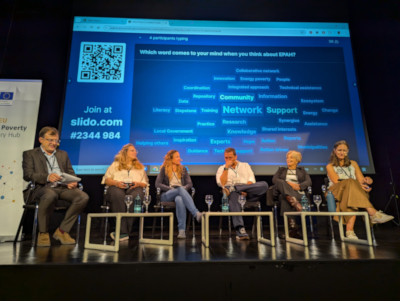
On the second day of the conference, attendees were presented with the work done by the EPAH consortium and validated the need and benefits of the strong network and community of relevant stakeholders brought together through the initiative. The reaction of the participants to the presentation of the EPAH methodology to take actions in addressing energy poverty was very positive. The questions of the audience referred mainly to the continuation of the initiative and how to ensure a better engagement of the vulnerable groups. EPAH’s experts provided detailed information for the use of the methodology, indicator for diagnosing energy poverty at the local level and multilevel governance. Ion Liviu Stochita, policy officer in DG ENER responsible for the EPAH initiative reiterated that the initiate will continue to receive full support from DG ENER and for the next phase the focus will be on identification of the communities most affected by energy poverty and offer tailored technical assistance according to the needs of these communities.
The day concluded with attendees with the site visit to Barcelona’s Energy Advice Points. This initiative, led by the city of Barcelona, provides citizens with direct access to personalised energy advice, helping them navigate energy rights, reduce consumption, and secure access to essential energy services. Guided by the responsible and coordinators of the Energy Advisory Points, around 100 participants were offered a first-hand view of how local governments can provide practical, on-the-ground solutions to energy poverty.
Organised by DG ENER, in collaboration with the Provincial Deputation of Barcelona (Diputació de Barcelona), the city of Barcelona, the European Committee of the Regions, and the European Economic and Social Committee, with the support of the Ecoserveis association, the event underscored the following points the importance of the network and the implementation of actions with a human rights based approach. Additionally, the following themes recurred throughout the conference:
- municipalities play a key role in the design and implementation of actions addressing energy poverty. Depending on their size, municipalities face different challenges and need different types of resources and (financial) support.
- Inclusiveness is key to a just transition. Some vulnerable groups such as women or children have different needs when it comes to energy and policies should aim to adequately cater for these needs.
- Building alliances is key to deal with energy poverty not only between administrations and citizens, but also involving other energy actors and businesses. Participants highlighted the benefits of exchanging and sharing experiences among peers, calling on the European Commission to further support such exchanges.
- Various examples, such as from the city of Budapest, highlighted the need to tackle energy poverty through structural measures and not exclusively through subsidisation of energy expenditure, slowing down much needed investments in energy efficiency and infrastructure.
- The lack of skills, particularly in smaller urban areas, was highlighted as a barrier to a just transition. Barcelona provided various case studies on training workers, particularly women to take up jobs that are traditionally targeting men such as in the building and renovation sectors.
Finally, the conference provided a valuable opportunity for stakeholders to exchange ideas, share experiences, and work together to ensure that no one is left behind in Europe’s journey toward fighting energy poverty.
Event photos can be accessed in the dedicated photo album.
Wrap-up video:
Watch the full recording of the first day:
Below you can access all the presentations:
Results from the EPAH Technical Assistances
- Sofia-Natalia Boemi, PostDoctoral Research Fellow, Energy Poverty and Energy Policies Expert, on Assessing Energy Poverty in East Macedonia, Greece
- Susana Camacho, S.ENERGIA, on Establishing a Mobile One-Stop Shop in Barreiro Municipality, Portugal
- Maria Olariu, FRSPAC, on Preparing the Ground for the Establishment of an One-Stop Shop in Alba Iulia, Romania
- Mireia Matencio, Energy Poverty Coordinator, Energy Management Department, on Assessment of Public Policies in Besancon, France
- David Morrissey, Sláintecare Healthy Communities Local Development Officer, South Dublin County, Ireland
- Izabela Kuśnierz, Polish Network Energie-Cités (PNEC), on Diagnosing Energy Poverty in Bydgoszcz, Poland
- Marcos Boj, ECODES, on Analysing Energy Poverty Data to Create a Regional Plan in Gironès region, Spain
- Jenny von Platten, Postdoctoral Researcher, the International Institute for Industrial Environmental Economics, Lund University, on Diagnosing Energy Poverty with a Focus on Vulnerable Households and Housing Types in Malmo, Sweden
- Béla Munkácsy, President, Environmental Planning and Education Network, on the Use of Firewood in Small Rural Municipalities in Bükkszentkereszt, Hungary
- Azzurra Spirito, Process Designer, on Helpdesk Assessmemt & Beneficial Partnerships, Milan, Italy
Artificial Intelligence and Energy Poverty: Innovative Solutions and Strategic Alliances Room
- Pilar Aránzazu Herráez López, Data Protection Officer and Responsible for Personal Data Management in AI Projects, Getafe City Council
- Jordi Cipriano Líndez, Director, Department of Buildings Energy and Environment (BEE Group), International Center for Numerical Methods in Engineering (CIMNE)
- Aniol Esquerra Alsius, Co-Director, Ecoserveis
- Patrici Hernández Claret, Responsible for the Energy Advisory Points, Social Rights, Health, Cooperation and Community Department, Barcelona City Council
Summer Energy Poverty: From The Evaluation to The Lived Experience
- Carmen Sánchez-Guevara, Associate Professor, Polytechnic University of Madrid
- Corentin Girard, Energy Area Coordinator, Valencia Clima y Energia Foundation
- Mar Satorras, Urban Sustainability Researcher, Coordinator of Heat Watchers in Action, Institut Metròpoli
- Interactive exercise
One-Stop Shops for Inclusion of Vulnerable Consumers in the Energy Transition
- José Pablo Delgado Marín, Head of the Energy Department, EuroVértice
- Andoni Hidalgo, Managing Director, Euroiker
- Erwin Mlecnik, Assistant Professor, Delft University of Technology, the Netherlands
- Marina Varvesi, Research and Innovation Manager, AISFOR
- Heleen Schockaert, Project Manager REScoop.EU
- Eleni Kanellou, Research Associate and Project Manager, NTUA
- Anamari Majdandžić, Senior Expert, Society for Sustainable Development Design (DOOR) (moderator)
Renovation for Tackling Energy Poverty: the Importance of Social Climate Plans and the Concept of Energy Sufficiency
- Xaquin García-Muros, Postdoctoral Researcher, Basque Centre for Climate Change BC3, Fellow Researcher, MIT & Ikerbasque Research Fellow
- Caroline Duvier, Project Manager and Researcher, Building Performance Institute
- Carmen Alonso Ruiz de Rivas, Architect, PhD, Instituto de Ciencias de la construcción Eduardo Torroja (CSIC)
- Paqui Luna, Architect, Fundació Habitat 3
WORKSHOP From Chaos to Clarity: Mastering Data for Effective and Inclusive Policies
- Iska Bunzeman, Researcher, Fraunhofer Fraunhofer Institute for Systems and Innovation Research ISI
- Miljenka Kuhar, Executive Director, Society for Sustainable Development Design
- Raquel Rodríguez Martínez, Project Manager, Ecoserveis
- Maria Font, Senior Energy Expert and Project Manager, Fundació Europace
- Marion Ligneau, Project Manager in Sustainability Consulting, Greenflex
- Jakub Sokołowski, Economist, Institute for Structural Research (IBS)
- Kristina Eisfeld, Project Manager, Climate Alliance (moderator)
WORKSHOP Tackling Energy Poverty: From Socioeconomic Insights and Youth Perspectives to Community Solutions
- ALL
- Giorgos Koukoufikis, Policy Officer, Joint Research Centre, European Commission
- Erhan Ozdemir, Project Officer, Joint Research Centre, European Commission ‣ Weronika Żurawska, Energy Justice Coordinator, Generation Climate Europe (GCE)
- Adrian Brasero, Project Manager, Co-founder & Sales, Neargy
- Unai Arrieta Salgado, Team Leader, Trama TecnoAmbiental S.L. (TTA)
- Mafalda Estêvão, Policy Analyst, European Youth Energy Network (EYEN) (moderator)
- Claudia Ferre, Energy officer, València Innovation Capital (VIC)
PANEL Human Rights-Based Approach to Tackling Energy Poverty. Putting the Right to Energy Into Practice
- Anna Sekula, Project Officer, European Union Agency for Fundamental Rights
- Laia Segura Cueto, Right to Energy and Climate Justice Campaigner, Friends of the Earth Europe, Coordinator of the Right to Energy Coalition
- Jaume Saura Estapé, General Deputy Ombudsman of Catalonia
- Josep Babot Barbero, Lawyer, Alliance Against Energy Poverty
- Arnau Comas Miñarro, Coordinator of the Catalan Association of Municipalities for Public Energy (AMEP)
PANEL Recognition of Gender Dimension in Energy Poverty Discussions
- Katjuša Šavc, Senior Expert, Focus Association for Sustainable Development
- Andrea Vides de Dios, Gender Expert, Engineering Without Borders (moderator)
PANEL Enhancing Inclusion and Addressing Energy Poverty and Green Transition
- Federica Giardina, Social Scientist, Ecoserveis
- Mònica Plana, Inclusion Area Director, ABD Wellbeing and Development Association
- Lara Rot, Project Mananger, ABD
- Carles Xavier Pelegrino Moreno, General Directorate of Social Services, Generalitat de Catalunya
WORKSHOP Introducing Health in the Design of Urban Programmes to Fight Energy Poverty
- Noemí García Lepetit, WELLBASED Project Coordinator, Valencia Innovation Capital
- Elena Rocher Vicedo, Health I+D+i Programme Officer, Valencia Innovation Capital
- Pilar Jordá Artigas, European Project Manager, Valencia Clima i Energia
SITE VISIT Energy Advice Points
Details
- Publication date
- 17 October 2024
